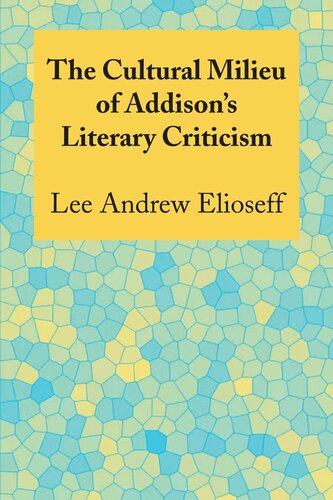

Most ebook files are in PDF format, so you can easily read them using various software such as Foxit Reader or directly on the Google Chrome browser.
Some ebook files are released by publishers in other formats such as .awz, .mobi, .epub, .fb2, etc. You may need to install specific software to read these formats on mobile/PC, such as Calibre.
Please read the tutorial at this link: https://ebookbell.com/faq
We offer FREE conversion to the popular formats you request; however, this may take some time. Therefore, right after payment, please email us, and we will try to provide the service as quickly as possible.
For some exceptional file formats or broken links (if any), please refrain from opening any disputes. Instead, email us first, and we will try to assist within a maximum of 6 hours.
EbookBell Team

4.7
66 reviewsThe whole history of literary criticism is illuminated by this analysis of one English critic’s work. It is, in effect, a literary case study presented as partial answer to the complicated question: what cultural conditions are conducive to the development of a particular theory of literature? Initially, Lee Andrew Elioseff defines four difficult responsibilities of the historian of criticism: the interpretation of his material in terms of all the cultural circumstances that produced it; elimination of the purely chance elements, such as private feuds and unimportant personal tastes; consideration of those aspects of criticism that best indicate the dominant critical opinions of the age and the principles that are leading it; and illumination of the present critical situation. Concentrating upon the first three of these obligations, Elioseff seeks the sources of modern literary criticism in the works of Joseph Addison and his contemporaries, analyzing with great care and accuracy their responses to problems—both literary and nonliterary—in their culture. From the analysis, Addison emerges as a very significant figure: a critic who moved from Renaissance and neoclassical humanism and became one of the most important predecessors of romantic criticism; a formulator of what was to become the “emotive strain” in literary criticism; an essayist who raised many problems shared by the “modern” psychological critic whose immediate concern is the effect of the literature upon its audience. Drawing abundantly from a wide knowledge of philosophy, literature, and history, and exercising an incisive critical acumen, Elioseff discusses Addison’s criticism in three aspects: “The Critical Milieu,” an interpretation of Addison’s relation to his age as it influenced his views on tragedy, epic poetry, and ballads; “Addison and Eighteenth-Century England,” a consideration of contemporary political thought, morals, and theology; and the “Empirical Tradition,” an analysis of Addison’s critical views as expressed in The Pleasures of the Imagination.